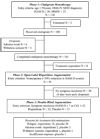Placebo-controlled study of relapse prevention with risperidone augmentation in older patients with resistant depression
- PMID: 17928573
- PMCID: PMC2788739
- DOI: 10.1097/JGP.0b013e31813546f2
Placebo-controlled study of relapse prevention with risperidone augmentation in older patients with resistant depression
Abstract
Objective: The effect of risperidone augmentation of citalopram for relapse prevention in older patients with antidepressant-resistant depression was evaluated.
Methods: Patients with major depression aged > or =55 years who had failed at least one adequate trial of an antidepressant received citalopram monotherapy (20-40 mg) for 4 to 6 weeks to confirm nonresponse (<50% reduction in Hamilton Rating Scale for Depression [HAM-D] scores). Those who achieved remission (HAM-D score < or =7 or Clinical Global Impressions severity score 1 or 2) after 4 to 6 weeks of open-label risperidone augmentation (0.25-1 mg) then entered a 24-week double-blind maintenance phase during which they received citalopram augmented with risperidone or placebo.
Results: The patients' mean age was 63.4 +/- 7.9 years; 58% were women; 61% had received two or more antidepressants during the current episode; 93 met the criterion for citalopram nonresponse and entered open-label risperidone augmentation. Of the 89 patients who completed risperidone augmentation, 63 achieved symptom resolution and entered the 6-month double-blind maintenance phase: 32 received risperidone augmentation and 31 received placebo augmentation. The median time to relapse (Kaplan-Meier estimates) was 105 days in the risperidone group and 57 days in the placebo group (Wilcoxon chi(2): 3.2, df = 1, p = 0.069). Overall, 18 of 32 (56%) from the risperidone group and 20 of 31 (65%) from the placebo group relapsed. Treatment was well tolerated.
Conclusion: In older patients with resistant depression and poor response to standard treatments, risperidone augmentation resulted in symptom resolution in a substantial number of patients and a nonsignificant delay in time to relapse.
Figures
Similar articles
-
Effects of risperidone augmentation in patients with treatment-resistant depression: Results of open-label treatment followed by double-blind continuation.Neuropsychopharmacology. 2006 Nov;31(11):2505-13. doi: 10.1038/sj.npp.1301113. Epub 2006 Jun 7. Neuropsychopharmacology. 2006. PMID: 16760927 Clinical Trial.
-
Risperidone for treatment-refractory major depressive disorder: a randomized trial.Ann Intern Med. 2007 Nov 6;147(9):593-602. doi: 10.7326/0003-4819-147-9-200711060-00003. Ann Intern Med. 2007. PMID: 17975181 Clinical Trial.
-
Escitalopram continuation treatment prevents relapse of depressive episodes.J Clin Psychiatry. 2004 Jan;65(1):44-9. doi: 10.4088/jcp.v65n0107. J Clin Psychiatry. 2004. PMID: 14744167 Clinical Trial.
-
[Efficacy and tolerability of escitalopram in anxiety disorders: a review].Encephale. 2008 Sep;34(4):400-8. doi: 10.1016/j.encep.2008.04.004. Epub 2008 Aug 15. Encephale. 2008. PMID: 18922243 Review. French.
-
Novel Augmentation Strategies in Major Depression.Dan Med J. 2017 Apr;64(4):B5338. Dan Med J. 2017. PMID: 28385173 Review.
Cited by
-
Therapeutic options for treatment-resistant depression.CNS Drugs. 2010 Feb;24(2):131-61. doi: 10.2165/11530280-000000000-00000. CNS Drugs. 2010. PMID: 20088620 Review.
-
Antidepressant pharmacotherapy in old-age depression-a review and clinical approach.Eur J Clin Pharmacol. 2017 Jun;73(6):661-667. doi: 10.1007/s00228-017-2219-1. Epub 2017 Mar 10. Eur J Clin Pharmacol. 2017. PMID: 28280892 Review.
-
Klotho at the Edge of Alzheimer's Disease and Senile Depression.Mol Neurobiol. 2019 Mar;56(3):1908-1920. doi: 10.1007/s12035-018-1200-z. Epub 2018 Jul 5. Mol Neurobiol. 2019. PMID: 29978424 Review.
-
Interventions to improve the appropriate use of polypharmacy for older people.Cochrane Database Syst Rev. 2018 Sep 3;9(9):CD008165. doi: 10.1002/14651858.CD008165.pub4. Cochrane Database Syst Rev. 2018. Update in: Cochrane Database Syst Rev. 2023 Oct 11;10:CD008165. doi: 10.1002/14651858.CD008165.pub5. PMID: 30175841 Free PMC article. Updated.
-
Second-generation antipsychotics for major depressive disorder and dysthymia.Cochrane Database Syst Rev. 2010 Dec 8;2010(12):CD008121. doi: 10.1002/14651858.CD008121.pub2. Cochrane Database Syst Rev. 2010. PMID: 21154393 Free PMC article.
References
-
- Charney DS, Reynolds CF, Lewis L, et al. Depression and Bipolar Support Alliance consensus statement on the unmet needs in diagnosis and treatment of mood disorders in late life. Arch Gen Psychiatry. 2003;60:664–672. - PubMed
-
- Frasure-Smith N, Lesperance F. Talajic: depression and 18-month prognosis after myocardial infarction. Circulation. 1995;91:999–1005. - PubMed
-
- Keller MB, Boland RJ. Implications of failing to achieve successful long-term maintenance treatment of recurrent unipolar major depression. Biol Psychiatry. 1998;44:348–360. - PubMed
-
- Fava M, Davidson KG. Definition and epidemiology of treatment-resistant depression. Psychiatr Clin North Am. 1996;19:179–200. - PubMed
-
- Russell JM, Hawkins K, Ozminkowski RJ, et al. The cost consequences of treatment-resistant depression. J Clin Psychiatry. 2004;65:341–347. - PubMed
Publication types
MeSH terms
Substances
Grants and funding
LinkOut - more resources
Full Text Sources
Miscellaneous




